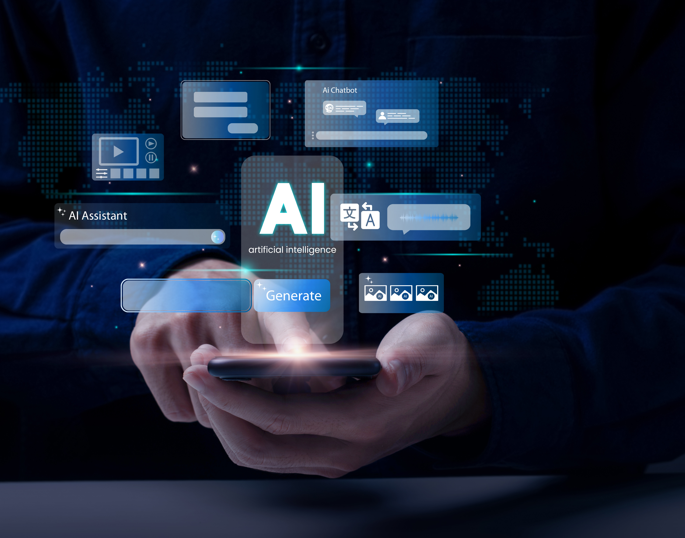Artificial intelligence (AI) is being rapidly integrated into B2B sales, transforming how sales teams operate and interact with clients.
As sales processes become more complex, AI tools offer solutions that streamline operations, enhance customer interactions, and provide valuable insights.
How can you use AI in B2B sales?
AI can be a powerful tool in several areas of your B2B sales process. Here’s a breakdown of how you can put it to work:
Automating lead generation
Lead generation is often time-consuming and labour-intensive. Luckily, AI can automate this process! By filtering potential clients based on specific criteria—like industry, company size, and growth signals—AI makes it easier for your sales team to focus on high-potential leads.
For instance, if a company announces plans to expand, AI can flag this news, prompting your sales team to reach out at the perfect moment when the prospect might be considering new solutions. This saves time and ensures that your efforts are spent on clients with the most promise.
Personalising sales outreach
Personalisation in sales outreach has proven to be a powerful strategy. AI can help create targeted messaging for potential clients by analysing behavioural data and engagement history.
Generative AI tools can assist in writing tailored emails and follow-ups that speak directly to each prospect’s needs. This means your sales team can build real connections instead of sending off generic messages.
In a world where everyone appreciates a personal touch, this kind of outreach leads to better engagement and higher conversion rates.
Refining lead scoring
Not all leads are created equal, and understanding which ones are most likely to convert is essential. AI helps by scoring your leads based on a variety of factors, like engagement levels and previous interactions, rather than just basic criteria like company size or industry.
As AI learns over time, it becomes better at identifying high-potential leads. This enables your team to allocate their time and resources more effectively, focusing on prospects that matter most and increasing the chances of closing deals.
Improving sales forecasting
Forecasting sales accurately can be tough, but AI can lighten that load. By analysing historical sales data, market trends, and customer behaviour, AI tools can generate reliable forecasts that help you make informed resource allocation decisions.
With these insights, your sales managers can make informed decisions about everything from inventory to staffing. Better predictions enable your team to prepare confidently for the future, which ultimately helps avoid costly mistakes.
Analysing performance metrics
Speaking of analysing data, keeping track of how well your sales team is doing is extremely important. AI can help analyse key metrics (KPIs) such as call outcomes, email engagement rates, and conversion statistics.
By understanding what’s working and what isn’t, your team can make real-time adjustments to improve their strategies. This ongoing analysis helps to fine-tune your sales efforts and boosts performance.
What are some of the benefits of using AI in B2B Sales?
Integrating AI into your B2B sales operations doesn’t just optimise processes; it delivers several key benefits:
- Saves time: AI automates repetitive tasks, freeing your sales team to focus on high-priority activities like engaging prospects and creating compelling offers.
- Supports better decision-making: With real-time insights from AI, your sales managers can make data-driven choices, which leads to more effective strategies.
- Encourages more personalisation: AI allows your team to send tailored messages that resonate with prospects, increasing engagement and conversion rates.
- Provides accurate forecasting: AI helps predict future sales more reliably, enabling your business to adjust strategies proactively and prepare for various scenarios.
Future implications of AI in B2B sales
The future of AI in B2B sales is very exciting! As technology continues to evolve, sales teams will have access to tools that can predict what customers need even before they ask for it. Imagine being able to anticipate customer preferences by using real-time data from different sources.
This means sales professionals can reach out with the right message at the right time, creating a more personal touch. Plus, with AI-powered assistants taking care of repetitive tasks, sales reps will have more time to focus on building strong relationships and closing deals.
But that’s not all! AI will also change how sales teams are trained and how they work together. With tailored training programs based on individual performance, each salesperson can improve their skills in ways that suit them best. On top of that, better collaboration tools will help teams share insights and strategies easily, leading to a more unified approach to customer engagement.
As businesses integrate these AI advancements while keeping customer privacy and trust in mind, those who adapt and embrace these changes will set themselves up for lasting success in a competitive market.
Conclusion
AI in B2B sales is much more than a buzzword; it’s a valuable resource that can transform your sales efforts for the better. By automating time-consuming tasks, refining lead scoring, and enhancing customer engagement, AI empowers sales teams to work more effectively.
The benefits—like improved efficiency and stronger customer connections—are evident. As more businesses adopt these technologies, those who embrace AI will not only streamline their operations but also position themselves for sustained success. You can also have a look at these steps to start using sales automation in your business











